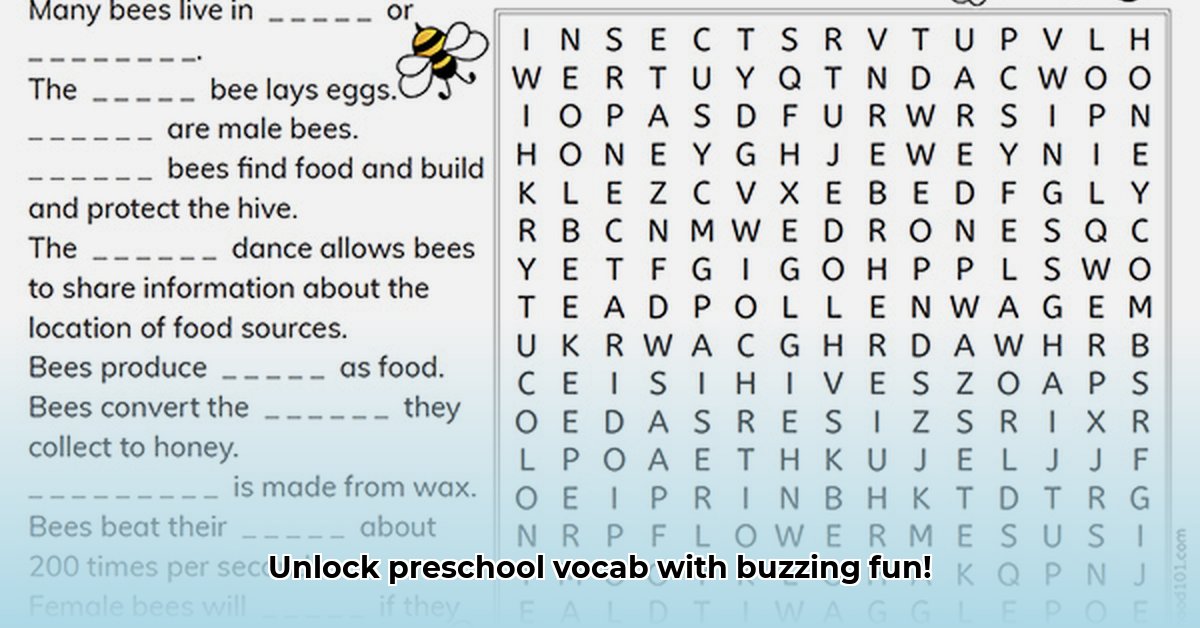
Fun & Engaging Bee-Themed Vocabulary Games for Preschoolers
Get ready to transform vocabulary learning into a buzzing adventure for your preschooler! These bee-themed games are designed to be fun, engaging, and effective, turning learning new words into a playful experience. Forget boring flashcards – we're focusing on hands-on activities that will have your little one excited to expand their vocabulary. For even more bee words, check out this helpful resource: Bee words list.
Did you know that playful learning significantly improves vocabulary acquisition in preschoolers? These games capitalize on that principle, making learning a delightful experience.
1. Honeycomb Word Hunt: A Sticky Situation!
This game is as sweet as honey! Create a honeycomb (draw one on paper, or use construction paper). Write bee-related words inside each cell (honey, hive, pollen, bee, flower, wings, queen, worker, honeycomb). Your preschooler hunts for specific words, then uses them in a sentence. For example, finding "pollen" could lead to, "Bees collect pollen from flowers."
How to Play:
- Create your honeycomb.
- Write bee-related words in each cell.
- Let your child hunt for words.
- Challenge them to use the words in sentences. This step is crucial for strengthening vocabulary comprehension and application.
2. Buzzword Bingo: A Buzzing Good Time!
Bingo gets a bee-themed makeover! Create bingo cards with bee-related pictures or words. Call out the words randomly; the first to get bingo wins! This is a fantastic way to incorporate visual and auditory learning styles simultaneously.
How to Play:
- Create bingo cards with bee-related words or images.
- Call out the words one at a time.
- Children mark matching words on their cards.
- "Bingo!" wins a small prize (sticker, extra playtime!).
3. Bee-utiful Storytelling: A Tale as Old as Time (with Bees!)
Storytelling boosts vocabulary naturally. Start with a simple sentence ("The fuzzy bee flew to the colorful flower"), then encourage your child to add details. Ask questions like, "What color was the flower?" or "Where did the bee go next?" This sparks creativity and vocabulary growth.
Tips for Success:
- Start with simple sentences.
- Encourage descriptive words (fluffy, bright, etc.).
- Let your child lead the story.
- Focus on engagement, not perfect grammar.
4. Flower Power Vocabulary Match: A Blooming Good Game!
This game combines visual learning with vocabulary. Create pairs of cards: one with a flower picture, the other with a related bee word (sunflower/pollen, daisy/nectar). Shuffle and have your child match them. This is highly effective for visual learners. Studies show that using visuals significantly improves vocabulary retention in young children.
How to Play:
- Make matching sets of flower pictures and words.
- Shuffle the cards.
- Have your child match the pictures and words.
5. Bee-lieve It or Not: True or False?
Test knowledge and vocabulary! Prepare true/false statements about bees. Have your child explain their reasoning using bee vocabulary. For example, "Bees make honey" (true), "Bees only like yellow flowers" (false). This promotes critical thinking and vocabulary application.
Example Statements:
- "Bees live in hives." (True)
- "All bees sting." (False)
- "Bees collect nectar." (True)
Making it Stick: Tips for Bee-utiful Vocabulary Growth!
- Keep it short: Brief, frequent play sessions are best.
- Positive reinforcement: Praise effort and celebrate success.
- Real-world connections: Discuss bees seen in nature.
- Adapt to your child: Tailor games to their learning style.
- Focus on fun: Engagement and enjoyment are key.
Key Takeaways:
- Engaging preschoolers with bee themes fosters a love for nature and science.
- Hands-on activities boost vocabulary retention and comprehension.
- A playful approach makes learning fun and effective.
Remember, the best approach to vocabulary development is the one that's most engaging for your child. Have fun and watch their vocabulary bloom!